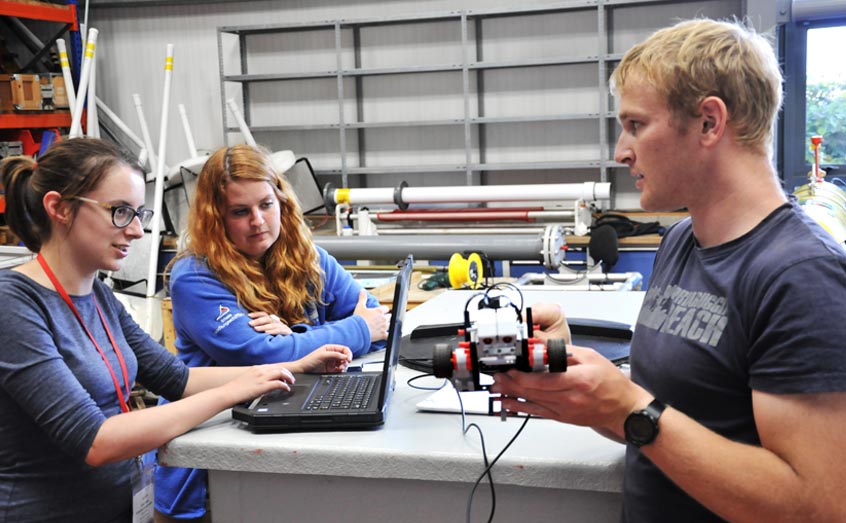SAMS news room
Robotics can attract budding marine scientists

PhD students on a unique training programme that combines marine science with robotic technology say the appeal of working with robotics could attract more students into marine research.
The students are part of the Next Generation Unmanned Systems Science (NEXUSS) Centre for Doctoral Training, funded by the Natural Environment Research Council (NERC) and the Engineering and Physical Sciences Research Council (EPSRC).
They will investigate how robots, or Smart, Autonomous Observing Systems (SAOS) can help scientists answer some of the biggest environmental questions, such as ocean warming and climate change.
A full cohort of 18 NEXUSS students gathered at SAMS last week to learn more about programming robotic vehicles, using Lego Mindstorms to simulate the piloting of ocean-going robotic gliders.
NEXUSS student Philip Leadbitter from the University of East Anglia said: “If you work within ocean sciences then you know things like gliders exist but we need to make more people aware of the robotics we use.
“Lots of people associate marine science with marine biology, because they see fantastic pictures of whales on TV. I didn’t know what a Seaglider was before I went to university but I love working with them.
“There is a lot more to marine science than marine biology and maybe robotics is an avenue through which people might find out a bit more about oceanography.”
The NEXUSS programme brings scientists and engineers together to share knowledge and to work together on marine science research.
Dr Phil Anderson, who runs the Centre for Doctoral Training at SAMS, said this training method inspired the title of his course ‘Taking the lid off the black box of robotics’.
He added: “We are taking the ‘scariness’ out of robotics so that those researchers who are less comfortable with high level mathematics can be introduced into using robotics in a practical way.
“The philosophy behind NEXUSS is to have a cohort of scientists and engineers together, encouraging the scientists to use autonomous systems and encouraging the engineers to get into the science. Working as teams, they have to learn each other’s languages.
“Technology is revolutionising how we do science by making areas of the planet more accessible. It’s therefore really important that we have scientists who know how to use the technology and can explain to engineers what is required by the science.”
SAMS is a partner in NEXUSS, which is hosted by the University of Southampton. British Antarctic Survey, Heriot-Watt University, National Oceanography Centre and University of East Anglia are also partners.
NEXUSS aims to develop a generation of future environmental science leaders through an innovative doctoral training programme founded around highly engaging SAOS Grand Challenge events.
